Local |
1870 - U.S. Census shows Sarah Houston, future wife of Ransom Williams, as a 15-year old African American girl living in Austin and working as a live-in servant. Ransom William is not recorded in this, or any future U.S. census.
1870-71 - Antioch Colony, a rural African American farming community is founded in Hays County, Texas. Some of the founders of this community are former slaves of the Bunton brothers who came to Texas from Tennessee and Kentucky in the 1840s and 1850s. Ransom Williams's first name suggests that he might be related to one of the Bunton slaves, Ransom Bunton, Sr.
1871 - Ransom Williams purchases his 45-acre farm in Travis County north of Antioch Colony for $4.00 an acre.
1872 - Williams registers a horse brand, "RA" for his 9 horses or mules in Hays County, Texas.
|
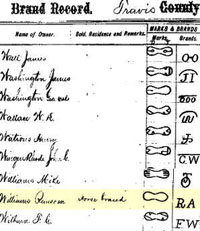 |
| 1875 - Ransom Williams and Sarah Houston marry and move to Ransom's farm on Bear Creek, about 12 miles south of Austin, Texas. The Williams are the only African Americans on the creek for at least five years. Their social lives are tied to their African American friends, neighbors, and relatives through school, church, and other social events, first at Antioch Colony and later at Rose Colony–Manchaca.
|
|
State |
1870s - African American soldiers known as Buffalo Soldiers serve in U.S. army forts along the Texas frontier.
|
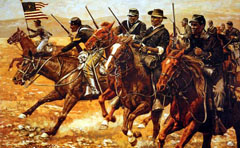 |
|
1871 - Railroad building begins again after the Civil War and the Houston and Texas Central Railway completes track to Austin.

1876 - Jacob Fontaine, a former slave, begins publishing The Gold Dollar, the first African American newspaper in Austin, Texas.
|
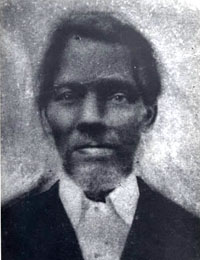 |
 |
|
National |
1870 - The 1870 U.S. Census is the first to list all African Americans by name. This is the first official record of a surname for many former slaves.
1870 - The 15th Amendment to the Constitution grants African American men the right to vote. |
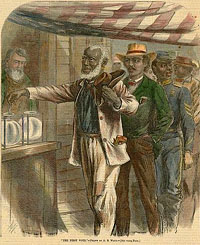 |
1875 - The Civil Rights Act of 1875 guarantees African Americans equal treatment in public accommodations, public transportation, and gives them the right to serve on juries. It is later declared unconstitutional.
1877 - Henry Ossian Flipper is the first African American to graduate from West Point Military Academy. |
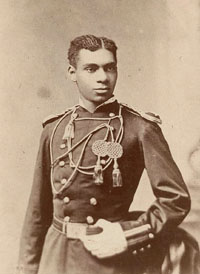 |
| 1877 - Reconstruction ends. |
|
